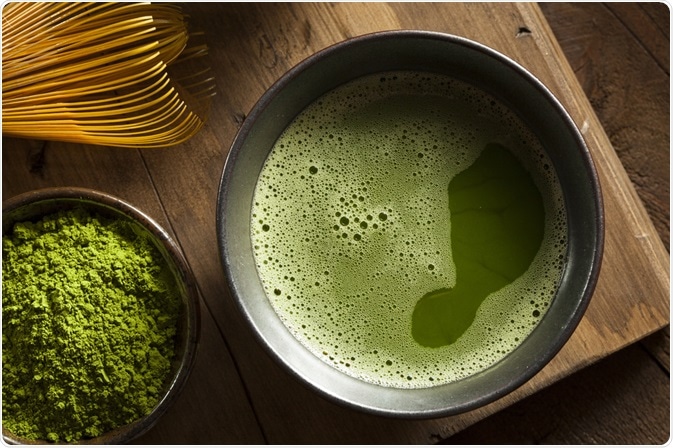Green tea is a popular beverage that has traditionally been produced in several Asian countries. The origin of green tea is a key market factor for consumers, and this has led to a surge in counterfeit tea products. Thus, methods that can be used to authenticate green tea are in high demand.
Scientists have recently demonstrated a method to infer the geographic origin of green tea from metabolite profiles analyzed by ultra-high-performance liquid chromatography coupled with high-resolution mass spectrometry (UHPLC-HRMS). The research was published in the May 2019 issue of the Journal of Food Composition and Analysis.
 Image Credit: Brent Hofacker/Shutterstock.com
Image Credit: Brent Hofacker/Shutterstock.com
Green tea contains secondary plant metabolites such as polyphenols that are considered beneficial for human health. However, depending on the geographic origin of the tea, the polyphenol content differs. This is because the tea plant experiences different growth conditions, such as different climates and soil qualities, and these environmental factors change the accumulation of polyphenols in the plant.
The geographic origin of green tea also plays a role in consumer preference, thus making it a key marketing factor. Established tea analysis methods, however, solely measure particular ingredients to assess the quality of tea, such as the total polyphenol concentration. The development of untargeted, large-scale metabolite profiling methods now allows scientists to evaluate tea samples more comprehensively, promising new ways of authentication.
Recently, researchers from the Institute of Chemical Technology in Prague (Czech Republic), led by Professor Jana Hajšlová, have demonstrated a method to infer the geographic origin of tea from metabolite profiling by liquid chromatography coupled to high-resolution mass spectrometry (UHPLC-HRMS).
Improved extraction of a large number of metabolites
The scientists used green tea samples from China (29 samples), Japan (17) and South Korea (8). Solvent extraction with dichloromethane/methanol mixtures released a large number of both polar and apolar metabolites. This sample preparation was completed in only 7 minutes.
The subsequent metabolite analysis was achieved in 13 minutes by reversed-phase high-pressure liquid chromatography separation (RP-HPLC) and metabolite identification by tandem mass spectrometry (MS/MS) with electrospray ionization (ESI).
For the analysis of the metabolite data, the researchers developed an automated pipeline including statistical methods such as principal component analysis (PCA) and (orthogonal) partial least squares discriminant analysis ((O)PLS-DA). These methods identify the key differences between datasets and thus tell which metabolites are most significantly different.
The composition of green tea differs between countries of origin
The dichloromethane/methanol extraction was efficient for sample preparation, and the researchers observed a total of 2187 compound signals in the UHPLC-HRMS analysis. The statistical assessment of the data demonstrated that green tea from different countries had a significantly different metabolite profile.
The data analysis also revealed that only a reduced set of few metabolites is sufficient to authenticate the geographic origin of the tea samples. This set of key metabolites included phospholipids, phenolic compound derivatives and catechins.
A few key metabolites reveal the green tea origin
Methods for large-scale metabolite analysis are well established, but can hardly be used for routine analyzes. In the present study, the researchers demonstrated that the geographical origin of green tea can be authenticated from only of few key metabolites, which can be monitored with less advanced equipment.
To generalize these findings, the predictive power of this metabolite set now needs to be tested with additional tea samples that had not been part of the previous analysis. The scientists have already demonstrated that the authentication of the green tea origin worked well with samples harvested in two subsequent years, though it will need testing whether the year-to-year variation over longer periods will bias the authentication.
Further Reading